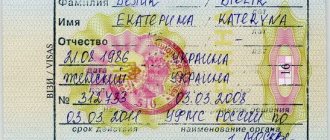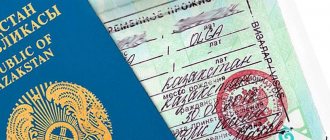Normative base
Federal Law of July 25, 2002 No. 115-FZ “On the Legal Status of Foreign Citizens in the Russian Federation”
Federal Law of July 18, 2006 No. 109-FZ “On Migration Registration of Foreign Citizens and Stateless Persons in the Russian Federation”
Decree of the Government of the Russian Federation of January 15, 2007 No. 9 “On the procedure for carrying out migration registration of foreign citizens and stateless persons in the Russian Federation”
Decree of the Government of the Russian Federation of September 30, 2019 No. 1271 “On establishing for 2021 the permissible share of foreign workers employed by business entities carrying out certain types of economic activities on the territory of the Russian Federation”
Peculiarities of work of foreign citizens in the Russian Federation
The following features of employment of foreign citizens (IG) are identified:
- An IG must be legally located in the Russian Federation and have a work permit or a patent.
- To attract foreign citizens arriving on a visa basis, the employer needs a special permit and quota. Highly qualified specialists are accepted outside the quota.
- The maximum allowable proportion of foreign workers in some industries is regulated by the state.
- It is necessary to notify the labor migration authorities of the Ministry of Internal Affairs of the region about the involvement of IGs
There are categories for which there are some concessions. These include refugees, foreigners permanently residing in Russia, citizens of member countries of the EAEU (Eurasian Economic Union), including Kazakhstan.
The main difference concerns the need to obtain permits to work in the Russian Federation. The provisions of Art. 96 - 98 of the international treaty on the creation of the EAEU established equal labor rights for citizens of the participating countries. Therefore, the answer to the question whether citizens of Kazakhstan need a patent to work is no, Kazakhs have the right to work in the Russian Federation without any restrictions and execution of additional documents.
In turn, employers are allowed to attract such specialists without taking into account measures to protect the national labor market, i.e. they do not need to issue permits, obtain quotas and comply with the maximum share of foreign workers.
Nuances in the employment contract
The specifics of concluding employment contracts with foreign workers are listed in Art. Labor Code of the Russian Federation:
- Duration of the contract. Indefinite contracts are concluded with foreigners (including citizens of Kazakhstan) if there are no grounds for their urgency - this rule is directly outlined by the Labor Code of the Russian Federation. In practice, many employers try to enter into contracts with a limited duration on their own initiative or, “at the instigation” of OMV inspectors who are incompetent in labor law, for the duration of the work permit or registration. We remind you that the limited period of validity of permits, as well as registration, is not the basis for the urgency of TD (Article 59 of the Labor Code of the Russian Federation).
- Information about work permit or patent. Often, when employing citizens of the Republic of Kazakhstan, the employer wonders whether citizens of Kazakhstan need a work permit or other similar documents. The answer is contained in the agreement on the EAEU: citizens of the participating countries, which include Kazakhstan, are allowed to work in Russia without additional conditions; they only need to have a passport and a migration card confirming the legality of their stay. It would be useful to point out this norm in the TD.
- Information about the medical policy. Information about the conditions for the provision of medical care must be reflected in the employment contract. These are the details of the VHI policy, the agreement on the provision of medical care to employees between the employing organization and the medical institution. If the details of such documents change or the employee receives a compulsory medical insurance policy, an additional agreement is drawn up, where the changed data is recorded.
- Contract language. Currently, it is almost impossible to meet a citizen of Kazakhstan who does not speak Russian, but if this happens, you must take care of translating the contract into a language understandable to a foreigner when signing it, or initially draw it up in two languages.
- Employee address. For temporarily staying foreign workers, the address of migration registration is used as the actual place of residence, at which the foreigner must reside. They recognize him from the tear-off part of the arrival notice, which is in the hands of ISIS. For temporary and permanent residents - the address of their permanent or temporary place of residence. Information about it is entered into the passport in the form of a stamp or issued in the form of a certificate. If accommodation is provided by the employer, it also doesn’t hurt to note this.
Otherwise, an employment contract with a citizen of Kazakhstan is no different from that with a citizen of the Russian Federation.
Employment of citizens of Kazakhstan
The peculiarities of employment of citizens of Kazakhstan are determined by the signed interstate agreements (in particular), according to which Kazakhs are practically equal to Russians in employment rights. They do not need a patent, the main condition is to be legally located on the territory of the Russian Federation.
Thus, answering the question of what documents a citizen of Kazakhstan needs to work in Russia, we can note the following:
- ID card (national passport);
- “stub” about registration for migration;
- health insurance policy;
- migration card (here it is important that “work” is indicated as the purpose of the visit to the Russian Federation);
- a document confirming knowledge of the Russian language;
- diploma of education;
- employment history;
- SNILS;
- TIN.
For employers, a brief step-by-step instruction for hiring citizens of Kazakhstan includes the following steps:
- verification of documents;
- employee registration;
- notification of the Main Directorate of Migration Affairs of the Ministry of Internal Affairs about the employment of a foreign employee;
- registration with tax and pension authorities.
Contract of employment
An employment contract is the main document that officially regulates the labor relationship between an employer and an employee.
For those who are interested in how a citizen of Kazakhstan can get a job in Russia, it is important to know about some of the features of this document:
- as with the Russians, it can be concluded indefinitely;
- an employment contract is the basis for legal stay in the country (if a temporary residence permit or residence permit is not issued);
- filled out in Russian;
- concluded only with adults;
- If the labor relationship between the employer and the employee is severed, but another enterprise manages to employ the latter within 15 days, then the migrant does not have to leave the country.
Taxation
Before employing a citizen of Kazakhstan in 2021, it is important to understand the issues of taxation of his income.
Taxation of foreign citizens depends on their status. The income of non-residents (staying in the Russian Federation for less than 183 days) is taxed at a rate of 30%, residents - 13%. An exception is made for citizens working on the basis of a patent and citizens of countries participating in the Treaty on the EAEU. Their income is subject to income tax at the rate of 13%, like citizens of the Russian Federation. This norm is reflected in Art. 73 Treaties. But this does not mean that all resident rules automatically apply. Standard tax deductions are not provided to the employee, and personal income tax is not considered as an accrual total, but for each payment separately until confirmation of his resident status is received.
In addition, the Ministry of Finance believes (letters dated July 14, 2016 No. 03-04-06/41639 and dated June 10, 2016 No. 03-04-06/34256). that it is necessary to control the status of the employee as of December 31, and if he turns out to be a non-resident, recalculate personal income tax at a rate of 30%, as happens with Russians. At the same time, the Federal Tax Service in a letter dated November 28, 2016 No. BS-4-11/ explains that the provisions of Art. 73 of the Agreement does not provide for tax recalculation. It is up to the employer to decide what to do in this situation.
How to conclude an employment contract
The basic norms of labor legislation related to how to hire a citizen of Kazakhstan in 2021 are the same as for Russians:
- actual permission to perform duties is permitted only after the conclusion of an employment contract;
- Employment contracts are concluded with them for an indefinite period and for a certain period (fixed-term) of no more than 5 years, if there are grounds (Article 59 of the Labor Code of the Russian Federation). Concluding a fixed-term contract without sufficient grounds is unacceptable.
Contents of an employment contract with a citizen of the Republic of Kazakhstan:
- date of conclusion and serial number;
- details of the parties;
- description of the employee’s job function and place of work;
- contract time;
- work start date;
- the length of the probationary period, if established;
- working hours and rest hours;
- terms of remuneration;
- characteristics of working conditions, guarantees and benefits, rights and responsibilities of the employee;
- rights and obligations of the employer;
- procedure for changing and terminating an employment contract;
- responsibility of the parties.
In addition, it is necessary to reflect the following nuances:
- information about the documents on the basis of which the migrant is allowed to work in the Russian Federation. Since the Kazakhs do not require such, they make a reference to the corresponding article of the treaty on the EAEU;
- information about the conditions of health insurance. If the employee has voluntary health insurance or the employer has entered into an appropriate agreement with a medical organization, indicate the details of these documents. If not, note that the employee is subject to compulsory medical insurance on the basis of the agreement on the EAEU;
- The absolute majority of those arriving from the Republic of Kazakhstan speak Russian at a fairly good level, but since there is not always documentary evidence of this, it is recommended to indicate in the TD that its conditions and content are understandable to the employee and do not require translation. This will help avoid disputes in the future.
We have prepared a sample contract taking into account these requirements.
ConsultantPlus experts examined a situation where an employment contract was concluded with a citizen of Kazakhstan and a probationary period of 3 months was established, but then the employee was fired by agreement of the parties and after 2 months was hired back again - is it legal to again establish a probationary period of 3 months for this employee or not. Use these instructions for free.
to read.
Social insurance and sick leave
Art. 98 of the Treaty on the EAEU regulates the procedure for social security of citizens of the participating countries. It is produced in exactly the same way as the Russians. Pension insurance for foreigners is carried out in the manner prescribed by Law No. 167-FZ of December 15, 2001 on compulsory pension insurance in the Russian Federation. This means that concluding an employment contract with a citizen of Kazakhstan entails the employer’s obligation to pay insurance premiums for compulsory medical insurance, compulsory social insurance in case of disability and in connection with maternity, and compulsory pension insurance in relation to these persons.
Hence the conclusion: sick leave is provided and paid to Kazakh employees in the usual manner.
Insurance contributions (sick leave, social insurance) for an employee from Kazakhstan
To find out more about sick leave and social insurance, you need to remember again about the Treaty on the EAEU, namely Article 98. It specifies both the rights and responsibilities of a working resident of one of the participating countries.
As a result, we see that social insurance is provided under the same conditions as for residents of our country. The exception is pension insurance. In the situation with foreign employees, it is regulated by Law No. 167-FZ of December 15, 2001 on compulsory pension insurance in our country.
As a result, the employer is obliged to make payments in relation to citizens of the Republic of Kazakhstan officially employed:
- insurance premiums for compulsory health insurance;
- social insurance in case of incapacity;
- compulsory social insurance in connection with maternity;
- compulsory pension insurance.
Let us add that according to the law, only those foreigners who have a voluntary health insurance policy (VHI) can work in our country. Another agreement on the provision of medical services in the country would also be suitable. If this document is not available, it will be impossible to employ a citizen of the Republic of Kazakhstan.
However, the legislation does not specify exactly who should be responsible for the availability of this policy for a foreign employee. Neither the employee nor the employer is obliged to do this. In this situation, a compromise can be found. After all, if both a foreigner and an organization want to work together, this problem can be solved by agreement.
Migration registration
After the latest changes to Law No. 109-FZ “On Migration Registration”, the obligation to register and remove employees from migration registration remains only for those employers who provide accommodation for employees. In this case, the employer is also required to control the timing of migration registration and the presence of a foreigner at this address.
Thus, before employing a citizen of Kazakhstan, it is necessary to decide whether the organization has the opportunity to provide him with housing or not, and based on this, determine whether he will become the receiving party and whether to apply to the OVM for the so-called registration (correctly: “placement on registration at the place of stay") of a foreigner or not.
To assign an employee to the MU, the receiving party must contact the territorial body of the Department of Internal Affairs of the Ministry of Internal Affairs at the location and provide:
- constituent documents;
- documents confirming the legality of ownership or use of residential premises;
- employment contract with IG;
- IG documents: passport, migration card, residence permit (if available);
- completed arrival notice. Today, the form approved by Order of the Ministry of Internal Affairs No. 180 dated March 24, 2020 is in force.
OVM employees check the completeness and correctness of filling out the documents, enter information into the database (PPO “Territory”) and return the detachable part of the notification, in which they put the registration period, stamp and signature of the official. This document is given to the foreigner.
The deregistration of a foreigner occurs in a similar manner. The form was approved by order of the Ministry of Internal Affairs No. 142 of March 18, 2019.
Registration and deregistration is not prohibited in other ways: through the MFC or mail, and in some regions - through State Services or using specialized software that ensures secure document flow between the OVM and the receiving party.
It is necessary to register and deregister within 7 working days from the date of arrival (departure) of the foreigner.
Migration registration of citizens of Kazakhstan - what an employer should know about
Migration registration is an important point that cannot be ignored by the employer. This is an activity in which information is recorded in Russia about the place of stay and residence of a foreigner, about his movement.
Amendments have been made to Law No. 109-FZ, which regulates this issue. Now employers must register and deregister only when they provide foreign employees with premises in which they will live. In this case, the employer must monitor the timing of migration registration and, to some extent, control the foreign employee (he will be required to reside there).
As a result, the company must decide whether it will provide premises to the citizen of the Republic of Kazakhstan, or whether he will solve this problem himself. After all, responsibility if a foreigner is allocated a room or apartment will fall on the shoulders of the employer.
If, nevertheless, the organization decides to provide a citizen of the Republic of Kazakhstan with premises, you will need to contact the migration department of the Ministry of Internal Affairs at the location. To do this, you need to collect a package of the following documents:
- confirming that the apartment (room, house, etc.) is legally owned;
- TD (labor dog.) with a Kazakh;
- documents of a foreign citizen;
- notification of arrival, which must be completed (see below for an example of a document).
After this, employees of the migration department will check these documents. If everything is filled out correctly and everything is accepted, the data is noted in the database (Territory application software). The detached part of the notice will be returned to the foreigner. It will indicate the registration period, put a stamp, and leave a signature. The same principle applies to deregistration. At the same time, register or carry out the reverse procedure for a certain period (seven working days from the date of arrival (departure) of a citizen of the Republic of Kazakhstan).
Important!
You can also register for migration or remove it from it through the Multifunctional Center (MFC) or post office. In a number of regions of the Russian Federation, this can be done thanks to State Services.







